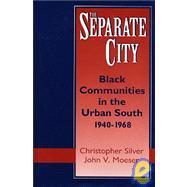The Separate City: Black Communities in the Urban South, 1940-1968
, by Silver, Christopher; Moeser, John V.- ISBN: 9780813119113 | 0813119111
- Cover: Hardcover
- Copyright: 4/20/1995
The districts in which southern blacks lived from the pre-World War II era to the mid-1960s differed markedly from those of their northern counterparts.
The African-American community in the South was (and to some extent still is) a physically expansive, distinct, and socially heterogeneous zone within the larger metropolis. It found itself functioning both politically and economically as a "separate city" - a city set apart from its predominantly white counterpart.
Examining the racial politics of such diverse cities as Atlanta, Richmond, and Memphis, Christopher Silver and John Moeser look at the interplay between competing groups within the separate city and between the separate city and the white power structure. They describe the effects of development policies, urban renewal programs, and the battle over desegregation in public schools.
Within the separate city itself, internal conflicts reflected a structural divide between an empowered black middle class and a larger group comprising the working class and the disadvantaged. Even with these conflicts, the South's new black leadership gained political control in many cities, but it could not overcome the economic forces shaping the metropolis. The persistence of a separate city admitted to the profound ineffectiveness of decades of struggle to eliminate the racial barriers with which southern urban leaders - indeed all urban America - continue to grapple today.
The African-American community in the South was (and to some extent still is) a physically expansive, distinct, and socially heterogeneous zone within the larger metropolis. It found itself functioning both politically and economically as a "separate city" - a city set apart from its predominantly white counterpart.
Examining the racial politics of such diverse cities as Atlanta, Richmond, and Memphis, Christopher Silver and John Moeser look at the interplay between competing groups within the separate city and between the separate city and the white power structure. They describe the effects of development policies, urban renewal programs, and the battle over desegregation in public schools.
Within the separate city itself, internal conflicts reflected a structural divide between an empowered black middle class and a larger group comprising the working class and the disadvantaged. Even with these conflicts, the South's new black leadership gained political control in many cities, but it could not overcome the economic forces shaping the metropolis. The persistence of a separate city admitted to the profound ineffectiveness of decades of struggle to eliminate the racial barriers with which southern urban leaders - indeed all urban America - continue to grapple today.






